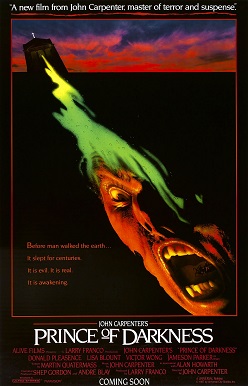Hey, everyone! Hope you are having a good spring and Lent season. It's starting to get nice out again. I just wanted to give everyone a quick update as to our status with Cannon Cruisers, since we are just about to start a new season after a rocky 2020.
We're currently in our fourth year(!) doing this, and you might have noticed that every season focuses in a certain era in Cannon Films history. If you've taken a look at what the episode list says, it states that the upcoming season will cover everything in the '90s up to the end of Cannon. The reason we're doing this is that because beyond 1990, Cannon's output had slowed considerably. This naturally means that we have to widen the scope of material to get a full season worth of episodes.
So, there is a very obvious question to pose here, and you might have already asked it. Does this mean season 7 is the final season of Cannon Cruisers?
The answer is No.
While season 7 intends to go up to the end of Cannon chronologically, we have also missed many movies on the way to getting there. I'm sure if you're a Cannon aficionado, you've noticed it. From availability issues to just plain ignorance, there are a lot of films we wanted to cover that we just didn't get to on our first pass. On the other hand, the same goes for Non-Cannon entries we just haven't had the opportunity to cover. Then there are movies we are considering covering again due to not being totally satisfied with the first go.
What this means is that season 8, not season 7, will be the last season of Cannon Cruisers, but it won't be a short one. It probably won't even be a consistent one. Our plans for the final season will be to cover and go over everything we can get out hands on when we can get it, and that means we might miss a week or two trying to do so. It'll definitely be longer than other other season considering how much searching will have to be done. There will also be more Non-Cannon episodes than any other season so far, both to fill holes and to cover many films we just can't get around to during a normal season.. That's just the nature of this sort of series, though with the unwieldy nature of the last season, it's going to be unavoidable.
When we started, streaming wasn't quite as big as it is now, and availability of these movies was the worst it had been . . . possibly ever. But that has changed since 2017. We have found a lot of the flicks we had first missed out on, and others we didn't even know existed at the time. The material we can cover today is far wider than what we could when we just started out. Availability has always been the toughest part of this series, and that is thankfully getting easier.
To sum up: there is still a lot we still want to cover. We won't be wrapping up anytime soon.
As for season 7, we've already started recording and we're ready with our premiere episode for next week. Keep your calendars marked for April!
There are still a few surprises and curveballs we want to throw you, but we obviously can't reveal them quite yet. Nevertheless, Cannon Cruisers is still going to continue on, so don't worry if that thought has been at the back of your mind. We still have plenty of the Cannon catalogue to cruise through. If anything, we're still just getting warmed up.
That's it for today! Remember that next Sunday will be the premiere episode of season 8! You're going to really like this one, I promise. It's a good one!
Last note, I wanted to share something.
In pseudo-related news, home video company MVD Rewind has just announced a Blu-Ray version of the Cannon films documentary, The Go-Go Boys: The Inside Story Of Cannon Films. I'll include the press release and the old trailer below.
The MVD Rewind Collection has announced that it will bring to Blu-ray Hilla Medalia's documentary The Go-Go Boys: The Inside Story Of Cannon Films (2014). The release will be available for purchase on July 20.
Synopsis: The Go-Go Boys: The Inside Story Of Cannon Films is a documentary about two Israeli-born cousins, Menahem Golan and Yoram Globus, who in pursuit of the American Dream, turned the Hollywood power structure upside down, producing over 300 films and becoming the most powerful independent film company in the world. Directed by Sundance Grand Jury Prize nominee Hilla Medalia (After the Storm), The Go-Go Boys is an up close and personal documentary that examines the complex relationship between two contradictory personalities whose combined force fueled their success and eventual collapse. Featuring interviews with Jean-Claude Van Damme, Michael Dudikoff, Eli Roth, Boaz Davidson along with Menahem Golan and Yoram Globus themselves, as well as archive footage of Sylvester Stallone, Charles Bronson and Chuck Norris in the definitive documentary about Cannon Films.
Special Features:
- Original Theatrical Trailer
- Reversible Artwork
- Collectible Mini-Poster
- Limited Edition Slipcover (First Pressing Only)
- AND MORE...
Will we cover it? That's always a possibility. For now, we have other things to get to, like getting back to recording episodes for season 7.
Thanks for tuning in, guys. It's great hearing your feedback and the energy these old movies can still supply audiences even decades later. It's been fun being a part of it, and we hope to be with you much longer!
Keep cruising that Cannon catalogue, and we'll see you next time!




